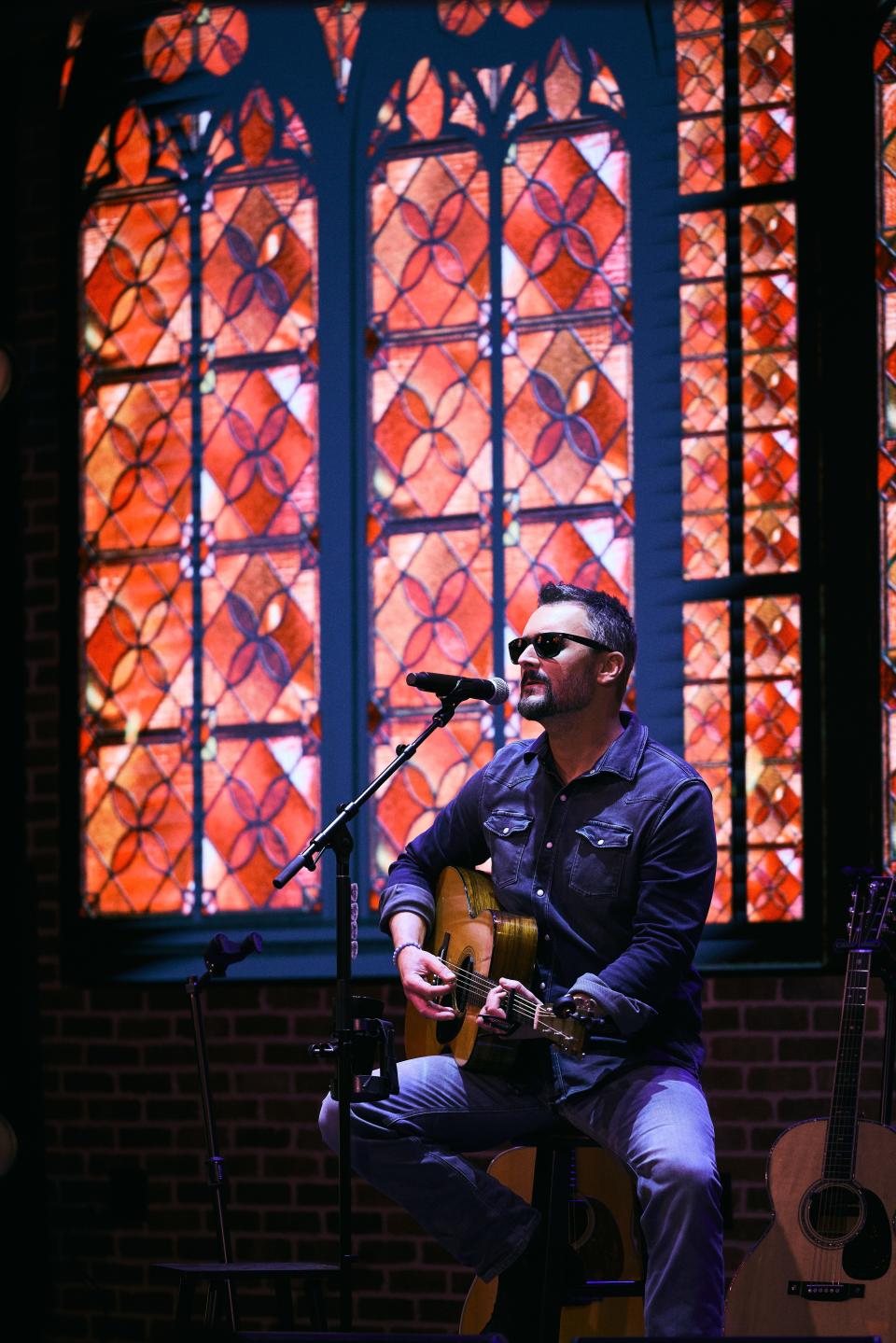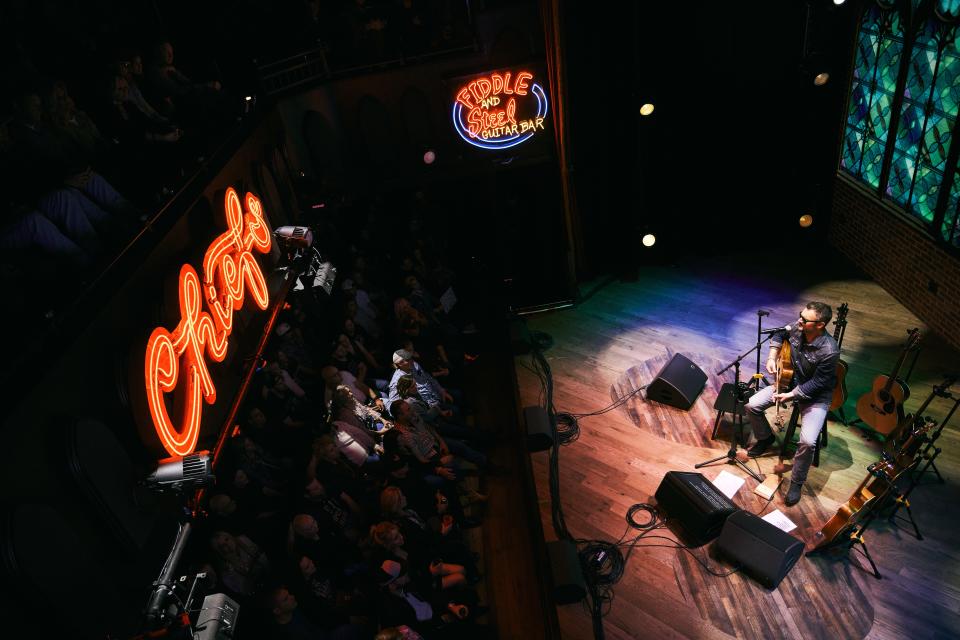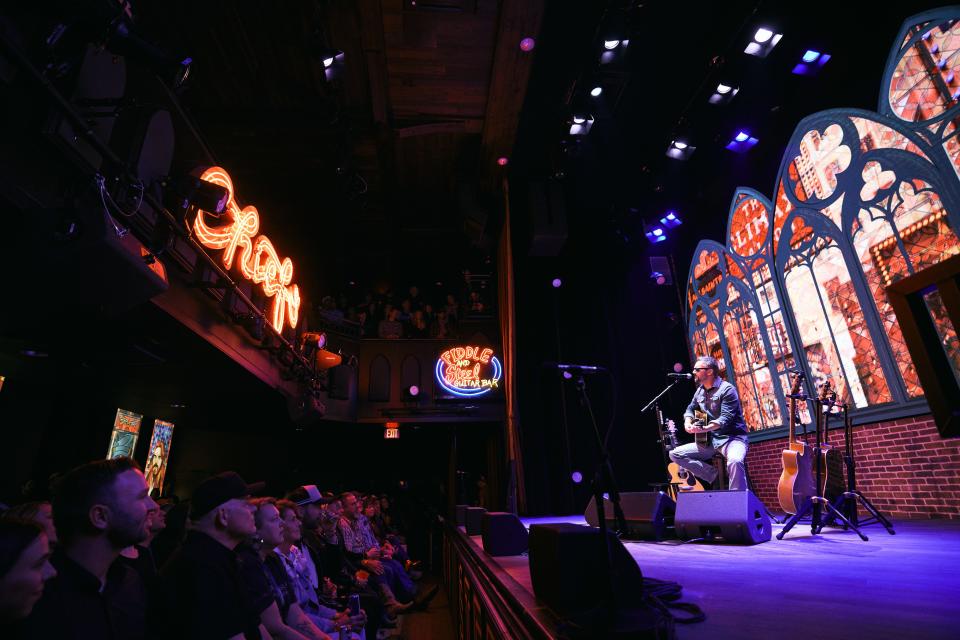Eric Church opens Chief's with intimate Nashville residency performance
The first of Eric Church's 19 nights onstage through early June at Chief's, his new, six-story Lower Broadway honky-tonk was, simply put, unforgettable. The incredibly intimate concert in front of 400 seated fans and friends in his Neon Steeple venue was one of the ultimate displays of the honesty, personal touches and against-the-grain actions and thinking that have defined his quarter-century in Nashville.
Church's set, like the bar itself, is a testament to the notion that, for patrons and artists alike, the power of a song (whether cover songs or originals), the strength of the whiskey and what happens when the rumble of hunger (both literal and metaphorical) is satisfied defines the greatness of a Music City watering hole.
No, it has nothing to do with the number of No. 1 hits or other accomplishments for the artist whose name is on the space. By 2025, a dozen artists with somewhere in the range of 250 No. 1 songs in five decades of country music history will either own or have their name and likeness plastered across the front of a piece of downtown Nashville real estate.

Yes, in under a decade, Nashville has made the art of celebrating astonishing individual excellence a fairly commonplace endeavor.
Chief's allure explained
Chief's will always have a rocking honky-tonk band playing in its front window and the green neon of the space's former tenants, Cotton-Eyed Joe's, is glowing behind them. There's also an upper-level dueling piano bar that should have the almost benign ambiance of an average big-city downtown hotel's restaurant. But how many of those have a wood carving of a Dale Earnhardt photo next to a 1980s-era black velvet portrait of professional wrestler Hulk Hogan on its walls, a memorabilia-filled bathroom and easter-egg-style details of a superstar artist's career tucked into every corner?
On one level, it should be visually over-stimulating. But this is the type of place that, if you're just exhausted enough, being served a stiff drink, eating Rodney Scott's James Beard award-winning Carolina barbecue and hearing anything from Hank Williams to 1970s-era John Prine or mid-2000s radio-ready pop ushers in a warm familiarity with the entire scene. It's fun times, it's good music. Sometimes, that's the counterbalance to the world that the doctor ordered.
However, the Neon Steeple is a whole other level of venue within a venue.
Modern legends and critically acclaimed favorites will revive their careers as everyday working artists there.
That's what Eric Church did last night.
A uniquely humble yet self-reverential performance
Yes, he was surrounded by six acoustic guitars and debuted unreleased songs alongside playing hits like "Country Music Jesus" and "Springsteen."

However, he also told winding stories of his 25 years in Nashville.
Church did this while facing iconic stained glass images that identified the inspirations of his life and career, including Johnny Cash flipping off the establishment, then-University of North Carolina student Michael Jordan hitting the game-winning shot in the 1982 NCAA Championship, the aforementioned Springsteen performing on his mid-1980s "Born In The U.S.A." tour and Waylon Jennings, Willie Nelson, and Dolly Parton, among many others.
Impressively, the event presented Church as not one of modern country music's most impactful artists -- instead, he was more friend number 401 in a room of 400.
The stories he told (and songs he sang) painted a picture of a man now uniquely able to celebrate himself but able to embrace the humility required to understand that teaching someone how to grow in the corner is as crucial as them learning how to behave in the spotlight.
Most powerful was his discovery that his route to fame was to be a modern spin on the same outlaw tale that saw an artistically unsuccessful Willie Nelson shuffle back to Austin after a decade, or Kris Kristofferson occasionally sort himself out in Johnny and June Carter Cash's Hendersonville, Tennessee, home.
For him, it was eventually discovering his craft and the people to whom he best appealed around the corner from Lower Broadway at Printer's Alley's Fiddle & Steel Guitar Bar.
His resolve was not fortified 17 steps from the Ryman Auditorium's back door at Tootsie's. Nor did he kick out the floodlights on the Ryman's stage, either. No, he also didn't have late-night picking sessions on the stage at Ernest Tubb's Record Shop.
Instead, Church honed his craft amidst a peculiar type of existential pain that the nightly invoking of cocaine and heartbreak can introduce to the human psyche. This is before having to work a job selling knives to sometimes those very same heartbroken and cocaine-addled people at 3 a.m.
Add later spending black coffee-fueled mornings with grizzled veteran songwriters on a not-yet-polished Music Row to that mix.
A man unaffected by convenience and seemingly perpetually wearing sunglasses and a baseball cap begins to take shape.
A beautiful life endured
Adapting his humanity to his circumstances helped him survive a broken-off marriage engagement and more than a few onstage scuffles before he moved to Nashville. Honing the former half of his fight-or-flight mechanism led to the ability to initially play songs like "How 'Bout You" and "Two Pink Lines" for every major label in town without interest.
It also gained him the ability to, once those songs connected with how country music and America's culture shifted, church respect from derision (both joking and otherwise) by acts including Rascal Flatts, Toby Keith and Taylor Swift.
Even deeper, it aligned him well with country-adjacent rockers like Bob Seger, too.

Through it all, he's remained a songwriter and storyteller.
He writes best when the wounds are freshest and when the moments feel drunk with the potential of re-setting his personal bar for greatness.
His triple-platinum 2015 single "Record Year" arrived without fanfare or promotion via a surprise album drop to his fan club. In the personal context of it being the day after the Covenant School shooting after surviving heart surgery, the death of his brother and the Route 91 Harvest Festival tragedy, listening to the radio and hearing the Charlie Daniels Band's "Devil Went Down To Georgia" struck him in a manner unlike any in his career.
That song received a ground-shaking standing ovation.
Mixing two of Church's most profound statements of the night arrives at the best takeaway from this season of Church's life, but also his new venue as it currently stands:
Life is a series of fragile moments that are endured when they're not beautiful.
This article originally appeared on Nashville Tennessean: Eric Church opens Chief's with intimate Nashville residency performance
